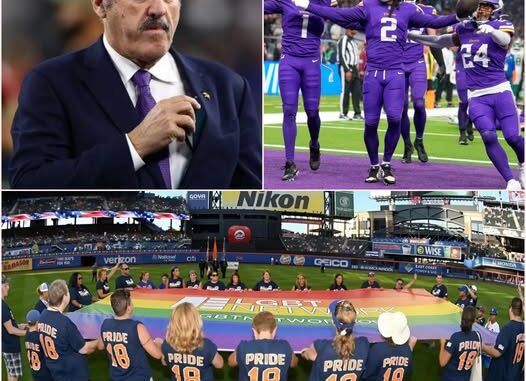BREAKING: Minnesota Vikings Owner Zigy Wilf Announces Boycott of NFL Pride Night: ‘On the Field, Everyone Should Be Focusing on the Ball, Not the WOKE’
In a move that has ignited a firestorm of debate, drawing sharp criticism from some corners and staunch support from others, Minnesota Vikings owner Zigy Wilf has announced his organization’s official boycott of the NFL’s upcoming Pride Night initiatives. The declaration, delivered with unyielding conviction, was accompanied by a statement that has quickly become a flashpoint in the ongoing cultural discourse surrounding professional sports: “On the field, everyone should be focusing on the ball, not the WOKE.” This pronouncement has thrust the Vikings, and by extension the NFL, into the epicenter of a contentious national conversation about inclusivity, corporate social responsibility, and the role of political and social messaging in professional athletics.
The NFL, like many major sports leagues, has in recent years made concerted efforts to promote diversity, equity, and inclusion (DEI) across its vast platform. This has manifested in various initiatives, including “Pride Night” celebrations aimed at recognizing and supporting the LGBTQ+ community. These events typically involve special themed merchandise, on-field acknowledgments, educational outreach, and partnerships with LGBTQ+ advocacy groups. The league’s stated intention behind these initiatives is to foster a welcoming and inclusive environment for all players, staff, and fans, reflecting the diverse fabric of its audience and participants. For many, these efforts are seen as a necessary and commendable step towards modernizing the league’s image and ensuring that professional sports truly represent and embrace all segments of society.
Zigy Wilf’s decision, however, represents a direct challenge to this prevailing trend. His statement, “On the field, everyone should be focusing on the ball, not the WOKE,” articulates a viewpoint held by a segment of the population that believes professional sports should remain apolitical and devoid of social commentary. The term “woke,” often used pejoratively by critics, is employed here to dismiss initiatives perceived as overly progressive or politically charged, suggesting they distract from the core mission of athletic competition. Wilf’s stance implies that the integration of social messaging into game-day experiences or league-wide campaigns detracts from the purity of the sport and alienates a portion of the fan base who simply wish to enjoy the game without perceived ideological interference.
The immediate fallout from Wilf’s announcement has been swift and multifaceted. From within the NFL, the reaction has been largely one of concern and, in some cases, thinly veiled disapproval. The league office, committed to its DEI initiatives, will likely issue a statement reaffirming its stance on inclusivity, potentially emphasizing its long-standing commitment to creating a welcoming environment for all. Other team owners and executives may privately express dismay, fearing that Wilf’s public declaration could undermine league-wide efforts and create divisions among franchises. The NFL has historically sought to present a united front on social issues, and a prominent owner openly boycotting a league initiative represents a significant breach of that perceived unity.
From the perspective of players, particularly those who identify as LGBTQ+ or are allies, Wilf’s statement is likely to be met with disappointment, if not outright condemnation. Many athletes have become increasingly vocal advocates for social justice and inclusivity, leveraging their platforms to promote causes they believe in. For these players, the idea that their identities or social concerns should be relegated to the sidelines in favor of a singular focus on the “ball” might feel dismissive and invalidating. It could create tension within the Vikings’ locker room, particularly if players feel their owner is not fully supportive of their diverse identities or their right to express them. The Players’ Association may also weigh in, emphasizing the importance of a respectful and inclusive workplace for all members.
Advocacy groups for the LGBTQ+ community have been among the most vocal critics of Wilf’s announcement. They view Pride Night initiatives not as mere political statements but as crucial symbols of acceptance, visibility, and safety for a community that has historically faced discrimination and marginalization. For these groups, Wilf’s boycott sends a chilling message of exclusion, potentially undermining years of effort to make professional sports more inclusive. They would argue that the “focus on the ball” rhetoric ignores the fundamental humanity of athletes and fans, suggesting that their identities can be neatly separated from their participation in sports. They might also point out that sports have always been intertwined with social and political movements, from Jackie Robinson breaking the color barrier to athletes kneeling for racial justice.
Conversely, Wilf’s announcement has garnered significant support from individuals and groups who share his perspective. This segment of the audience often expresses fatigue with what they perceive as an overreach of “woke” ideology into various aspects of public life, including sports. They applaud Wilf for taking a stand against what they see as unnecessary social messaging, arguing that sports should be a sanctuary from political divisiveness. For these fans, the focus should indeed be solely on the athletic competition, and any deviation from that focus is seen as a distraction. This support base, while perhaps not representing the majority, is vocal and often influential, providing a counter-narrative to the league’s DEI efforts.
The economic implications of such a boycott are also worth considering. While Wilf’s stance might appeal to a certain demographic, it risks alienating others. Corporate sponsors, increasingly sensitive to public perception and committed to their own DEI goals, might re-evaluate their partnerships with the Vikings or even the NFL if they perceive a misalignment with their brand values. Ticket sales, merchandise revenue, and broadcast viewership could also be impacted, depending on how different segments of the fan base react to the controversy. In an era where consumer values often influence purchasing decisions, a perceived lack of inclusivity can have tangible financial consequences.
The “focus on the ball” argument, while seemingly straightforward, belies a deeper philosophical debate about the nature and purpose of professional sports. Is sports purely about competition and entertainment, or does it also have a social responsibility? Proponents of inclusivity argue that sports, as a powerful cultural force, have a unique ability to unite people, promote understanding, and drive positive social change. They believe that ignoring social issues or actively excluding certain groups runs counter to the very spirit of fair play and community that sports often claim to embody. They might also argue that for many athletes, their identity is inextricably linked to their performance, and asking them to compartmentalize their lived experiences from their professional lives is unrealistic and unfair.
The term “woke” itself has become highly charged and often lacks a precise definition, making constructive dialogue challenging. For some, it signifies an awareness of social injustices and a commitment to progressive values. For others, it has become a pejorative term used to dismiss any social or political stance they disagree with, particularly those related to identity politics or social justice. Wilf’s use of the term in his announcement immediately frames the debate in a polarizing manner, making it difficult to find common ground or engage in nuanced discussion.
The controversy surrounding Wilf’s announcement also highlights the complex relationship between team owners, players, and the league office. Owners, as private businesspeople, often have strong personal convictions and the financial autonomy to act on them. However, they also operate within a league structure that seeks to maintain a unified brand and consistent messaging. When an owner’s personal stance clashes with league-wide initiatives, it creates tension and forces the league to navigate a delicate balance between respecting individual autonomy and upholding collective values.
Looking ahead, the ramifications of Wilf’s decision will likely unfold over time. The NFL will face pressure to respond in a way that reaffirms its commitment to inclusivity without unduly alienating a franchise owner. The Vikings organization itself will have to manage internal dynamics, particularly within the locker room, where players may hold diverse views on the issue. Fans will continue to express their opinions, potentially impacting attendance and viewership. The broader cultural conversation about sports and social messaging will undoubtedly intensify, with this incident serving as a prominent case study.
It is possible that Wilf’s stance could embolden other owners or figures within sports who share similar views, leading to a more fragmented approach to social initiatives across the league. Conversely, it could galvanize those who advocate for greater inclusivity, prompting stronger and more unified responses from players, other teams, and advocacy groups. The outcome will depend on the sustained pressure from various stakeholders and the league’s strategic response.
Ultimately, Zigy Wilf’s announcement is more than just a boycott of a specific event; it is a declaration of a philosophical position on the role of sports in society. His statement, “On the field, everyone should be focusing on the ball, not the WOKE,” encapsulates a viewpoint that prioritizes athletic purity over social engagement. This perspective, while appealing to some, stands in stark contrast to the growing trend of professional sports leagues embracing their platforms for social good. The ensuing debate will undoubtedly shape the future trajectory of inclusivity efforts within the NFL and serve as a significant moment in the ongoing cultural dialogue about the intersection of sports, politics, and identity. The ball, it seems, is now firmly in the court of public opinion, and the game is far from over.

